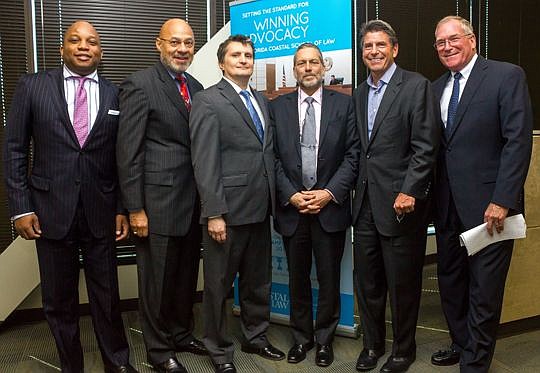
Howard Royce says that when he dug deep into his pocket in 1996 and enrolled at his hometown’s new law school, he was taking a huge risk.
Fueling the intensity for Royce and his classmates was Florida Coastal School of Law’s accreditation status remaining in limbo until months after the Jacksonville school’s first class graduated in spring 1999.
Ultimately, the gamble paid off. Florida Coastal’s founders and faculty kept their end of the bargain, says Royce, a Jacksonville attorney who specializes in product liability, technical law and personal injury.
“FCSL definitely delivered the product to the charter class of 61 students …” Royce said. “We took the risk of attending (founding school dean) Don Lively’s vision, which was a law school with a new set of metrics that were focused on preparing the students to practice law, (and) definitely, FCSL presented law as the third branch of government.”
Royce was among Florida Coastal’s alumni to attend Founder’s Day activities Saturday through Monday, including a recognition brunch headlined by former two-term Detroit mayor Dennis Archer.
Charter board and faculty members were on hand for the celebration. The school’s original board of directors was Lively, Richard Danford, Greg Manocherian, Irv Sonnenchein, Bernard Turner, Rita Turner, Ron Stahnke, Ron Bailey and Richard Matasar.
“Collectively, you all are visionaries. I compliment you on your investment and thank you for your vision and leadership — and I think the future for Florida Coastal School of Law is tremendously bright,” said Archer, who chairs the National Policy Board for the InfiLaw System, a consortium of independent law schools that includes Florida Coastal.
The school’s charter class member Jim Farah, a Jacksonville attorney, said on Monday the school has established a niche for helping students learn to practice law.
“I’m very proud of what the school has done and where it’s headed,” said Farah, an adjunct professor for Florida Coastal. “The school remains very student-centered and focused on turning out attorneys that can understand and meet the needs of clients today, especially the needy.”
Also a school foundation board member, Farah says Florida Coastal’s forte may be its in-house clinics, which enable students to represent indigent clients who are referred from various agencies. Under the supervision of faculty, the students staff the school’s family law, immigration rights, criminal defense, disability and benefits, and business and entrepreneurial law clinics.
“Successful law schools are not all about producing high-powered attorneys or in-house counsel,” Farah said. “Those things are all nice, but it’s about having the skill set that you need, and the foundation of those skills are learned through the clinics that are offered (at Florida Coastal).”
Recent clinic success stories were highlighted in a video at the Founder’s Day Recognition Brunch, which was followed by a symposium titled “Innovation in Legal Education and Practice.”
Danford, the Jacksonville Urban League chief executive officer, said Monday he’s particularly impressed with the school’s adaptation to technological advances and job preparation, along with its Moot Court team’s No. 1 national ranking.
“I think the best word is ‘responsive’ and I think their success in Moot Court is a huge achievement,” he said. “That is a skill and it says something about the preparation and training at the school.”
Florida Coastal, which targets students from diverse socioeconomic backgrounds, has a fall 2014 enrollment of 1,121. The National Jurist, a legal education magazine, lauded the school in 2013 for being innovative and in 2014 for its practical training opportunities. However, the magazine’s most recent grades for Florida Coastal are “D” for affordability and post-education employment, and “C” for bar exam pass rate.
The school was criticized in The Atlantic magazine for accepting students who have little chance of passing The Florida Bar exam or finding a job.
Those students, the article said, were left heavily in debt with no way to pay for it.
Opportunities for overall improvements were broached during Monday’s recognition and symposium, as was public disparagement the school has endured.
“The more successful we are, it seems the more feverish the criticism is,” said Interim Dean Chidi Ogene.
In an interview Monday, Ogene said that among other initiatives, Florida Coastal has a task force focused on improving Bar exam pass rates. Also, some students are being admonished to make law school more affordable by down-scaling their lifestyle, he said.
Royce said he thinks the affordability of law school’s impetus is ultimately rests on students’ shoulders.
“As for the current FCSL law students, each must make a hard-line business decision and conduct a cost-benefit analysis of paying for the education, including taking on student loans, versus their individual prospects for gainful employment,” he said.